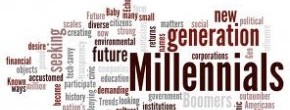 In spite of the rapid technological development employees are still considered the main resource for organizations, and hence employee motivation and retention continue to be of great importance at a global scale. However, employees’ work related attitudes and preferences do change over time, which implies that organizations need to tailor their people management strategies to satisfy the needs of different workforce generations.
In spite of the rapid technological development employees are still considered the main resource for organizations, and hence employee motivation and retention continue to be of great importance at a global scale. However, employees’ work related attitudes and preferences do change over time, which implies that organizations need to tailor their people management strategies to satisfy the needs of different workforce generations.
Having conducted the largest global generational study of its kind, PWC together with the University of Southern California and the London Business School capture the experiences of the new generation of employees – Generation Y or also labeled the Millennial workers (those born between 1980 and 1995).
The NextGen study’s (2013) main findings reveal that work/life balance is the major topic for Millennials, as it drives their retention in the work place, and also influences their choice of a professional career track. Indeed, Millennials seem to value work/life balance more than any other generation of the workforce. They are not willing to sacrifice their personal life and make their work life a priority, even when these sacrifices are promised to positively influence their future career steps. Moreover, ‘Generation Y’ want flexibility in their working place and working hours, as their main concern is to ‘get the work done’ rather than to fulfill the number of hours in the office. Such approach to work productivity does not signify less commitment though, because Millennials were found to be as hard working as their senior colleagues. In regards to work environment, the new generation expects team spirit, interesting work, and opportunities for international experience to be present in their workplace. Moreover, being recognized and rewarded for their good job is of greater importance to ‘Generation Y’ compared to their older counterparts.
In light of the NextGen study findings, there are several practical suggestions for organizations to take into account.
Implications for Organizations
- Engage your employees by ensuring work/life balance
The new generation of employees is more sensitive towards rigid working hours in the office and less prone to do overtime work than before. Therefore, companies could create flexible work cultures that promote work/life balance for their employees. For example, giving possibilities of virtual work or flexible working schedules may be a positive solution for many employees. As discussed in one of my previous blog posts, the benefits of virtual work are especially pronounced for multinational organizations, reducing the travel requirements of their globally mobile employees. On a similar note, the NextGen survey makes a point about accelerating integration of technology into the workplace, as it is another tool for providing greater flexibility and increasing work efficiency.
- Acknowledge and reward your employees
Millennials expect their work to be meaningful and, thus, their input to be recognized and rewarded. As such, companies should try to make their compensation and reward systems more transparent, and acknowledge the results of their employees more regularly. For example, variable pay systems linked to main performance indicators can serve as good motivators in this situation. However, apart from tangible rewards, employees can benefit also from verbal feedback, support, and higher involvement in decision making related to their work assignments.
- Build a team culture
Millennials want to be part of a team, hence teamwork and sense of community should be emphasized in the organization. Naturally, facilitating the sharing of organizational values and work goals, promoting communication at the team level, and supporting different social activities within the team would work towards increasing team cohesion.
- Create opportunities for global mobility
Just like organizations become more global, so do the mindsets of their employees, who look for opportunities of international experiences within their careers. Luckily, such preferences of Millennials are quite beneficial for multinational organizations that should be interested in developing global competencies of their employees. Also, providing a variety of international assignment types, such as short term, long term, commuting, and virtual assignments, will help achieve employees’ global mobility needs.
All in all, the NewGen survey draws a picture of a “typical” Millennial employee that is quite different from other generations. Therefore, organizations should acknowledge that ‘one size does not fit all’ and try to make their practices and policies more flexible. I would argue that the latest notion concerns not only generational but also cultural differences among employees, which should be accounted for in a continuously globalized business world.


Dear Professor Reiche B. Sebastian
I have seen you have a lot of publications in relation to knowledge transfer between expatriates and host country nationals. Are you still working on this topic? Could we collaborate in future research on something related to this focus?
Appreciate for your reply. Best regards